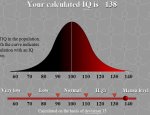Zom-B To respond to your statement about wondering why polymath was thrown in there. It just seems to fit to me, when talking about people being good in different areas from each other, and wondering how to compare apples to oranges so to speak. It seemed to me the logical next step was throw in a whole bowl of fruit to compare to an apple and the orange. Kind of to point out through complication that's its impossible to compare one intelligence to another. The mind is just too complex to really compare one person to another. (My stance from the beginning)
As to your comments regarding physical skills like working with your hands, etc. I must respectfully disagree. I am well aware the usual scientific stance on intellect revolves around the kind of intelligence that the scientific community themselves respect the most. (the scientific community includes of course psychiatrists etc, as well as the medical fields) However I disagree completely with this interpretation of intellect.
When it comes down to it, intellect is the brains capacity to process data. This data can be in ANY form the brain must process. Therefore anything we do or think uses our respective intellects to do or to think. Controlling those fine motor skills, or honing one's reflexes to a knife edge, may have different results from honing one's mind with higher education to perform complex calculations. However it's still simply training one's mind to get more out of it. As such it's 100% dependent on a person's natural capacity for that kind of mental processing. Not everyone can learn to be a scientist. Likewise not everyone can develop the reflexes or coordination to be an olympic athlete. Anyone can build muscles. Not anyone can win an olympic gold medal regardless of how many muscles they build up. the mental component is still there.
When it comes down to it, we take a LOT of what our brains due for granted. We do not really appreciate the extent of just what all has to be processed. I don't personally think you can pick and choose to call something "intellect" when it doesn't reflect the full potential of the brain. And understanding the brain's complex behavior is still a long ways away for us. We can't even make a computer program recognize things with a camera the way we do with vision, and the simple act of seeing is proving to be amazingly complex processing. Let alone sound processing for familiar sounds. Add in the sense of touch. (the feedback of which allows for reflexes) If we can't even understand mental vision processing well enough to replicate it with a computer and a camera, then how on earth can we attempt to classify much more complicated higher reasoning leaps of the brain?
My point remains: Intelligence is a great unknown, that is routinely treated by society as a known and understood thing. However we are far from knowing much about it, and take great leaps of judgment, largely unfounded, when attempting to classify and "rate" someone's intellect. This has more in common with prejudice and bias then with the scientific method. So I dislike I.Q. tests and results, and reject any definition of intelligence that doesn't acknowledge all forms of mental processing. Meh I'm babbling here, and I've written another long winded pointless post.

If you've read all this way then props to you





